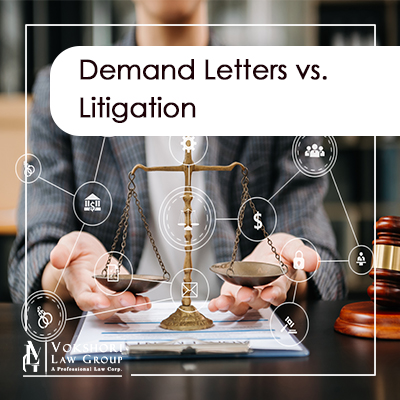
When facing a legal dispute, one of the first decisions you’ll need to make is whether to start with a demand letter or proceed directly to litigation. Each approach has its own set of advantages and disadvantages, and the best choice depends on the specifics of your situation.
What is a Demand Letter?
A demand letter is a formal written request sent to the opposing party, outlining your legal claims and the actions you want them to take, such as paying a debt or ceasing a particular behavior. The letter often serves as a precursor to litigation and is designed to resolve the dispute without the need for court intervention.
Pros of Using a Demand Letter
-
Cost-Effective
-
-
- Demand letters are significantly cheaper than litigation. The cost of drafting and sending a demand letter is typically a fraction of what litigation would cost, making it an attractive option for those looking to resolve a dispute without incurring substantial legal fees.
-
-
Preserves Relationships
-
-
- Demand letters are generally less adversarial than litigation. They provide an opportunity to resolve the dispute amicably, which can be crucial if you wish to maintain a working or personal relationship with the opposing party.
-
-
Opens the Door to Settlement
-
-
- Sending a demand letter can lead to early settlement discussions. It shows the opposing party that you are serious about your claims while also indicating a willingness to resolve the matter without the need for court proceedings.
-
-
Time-Saving
-
-
- Litigation can be a lengthy process, often taking months or even years to reach a resolution. A demand letter, on the other hand, can prompt a quicker response, potentially resolving the issue within weeks.
-
-
Provides Legal Clarity
-
- A well-drafted demand letter provides the opposing party with a clear understanding of the facts and laws that support your position. In some cases, this clarity alone can prompt the other party to take corrective action, avoiding the need for litigation altogether.
Cons of Using a Demand Letter
-
Non-Compulsory
-
-
- A demand letter does not compel the opposing party to act. There’s no legal requirement for the recipient to respond or take action, which means that if the other party is uncooperative or dismissive, the letter may be ignored.
-
-
No Immediate Legal Action
-
- If your situation involves an urgent matter, such as a looming statute of limitations, waiting for a response to a demand letter might not be feasible. In such cases, proceeding directly to litigation may be necessary to protect your rights.
When to Consider Litigation
Litigation is the formal process of taking a dispute to court. It is a more aggressive approach and involves a series of legal procedures, including the filing of a complaint, discovery, and trial. While it is more time-consuming and costly than a demand letter, litigation can be the more effective route in certain situations.
- Compulsory Process
-
-
- Litigation compels the opposing party to respond and participate in the dispute otherwise you will be entitled to a default and judgment against them. If you believe the opposing party would ignore your demand letter it might make sense to initiate litigation from the start.
-
- Immediate Legal Action
-
-
- If you are facing time-sensitive issues, such as an approaching statute of limitations, litigation allows you to take immediate legal action. Filing a lawsuit preserves your claims and ensures that your case can proceed through the courts.
-
- Discovery Process
-
-
- One of the significant advantages of litigation is the discovery process, which allows you to obtain evidence from the opposing party that might not be voluntarily disclosed. This process can uncover crucial information that is not publicly available, strengthening your case.
-
- Legal Authority and Enforcement
-
-
- A court ruling carries legal authority and results in a binding judgment. This means that if you prevail, the judgment can be enforced through various legal mechanisms, such as wage garnishment or property liens, ensuring that the opposing party complies with the court’s decision.
-
- Potential for Damages and Costs
-
- Litigation can result in monetary damages being awarded, including attorney fees and court costs if you prevail. This can be particularly important in cases where significant financial losses or injuries are at stake.
Making the Right Choice
Choosing between a demand letter and litigation requires careful consideration of the specifics of your case. If you are looking for a cost-effective, less adversarial way to resolve your dispute, a demand letter may be the best starting point. However, if you need immediate legal action, access to discovery, or the enforcement power of a court judgment, litigation might be the more appropriate route.
Conclusion
Whether you start with a demand letter or proceed directly to litigation, it’s essential to weigh the pros and cons in the context of your particular situation. Consulting with an experienced attorney can help you determine the best course of action and ensure that your legal rights are protected.
If you have questions or need assistance with a legal dispute, the Vokshori Law Group is here to help. Our team of skilled attorneys can provide personalized advice and representation to meet your specific needs. Contact us today at (855) 855-2608 or visit www.VokLaw.com to schedule a consultation.






